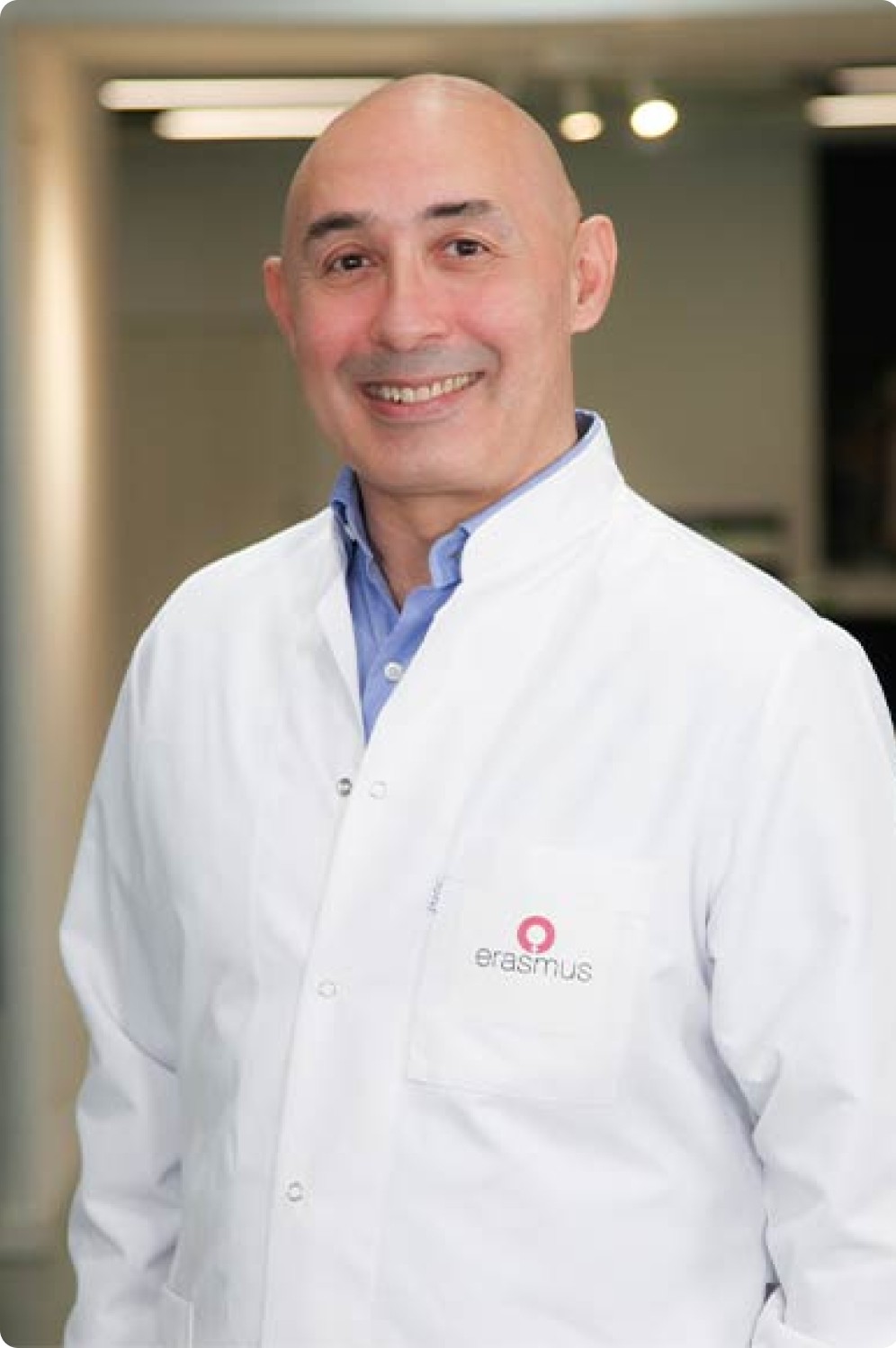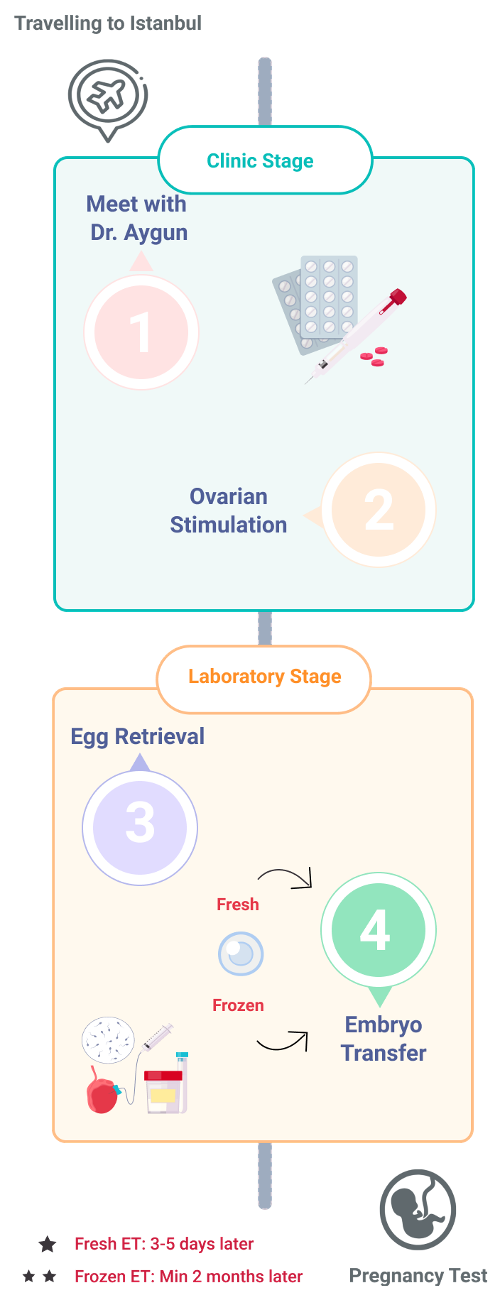What is an IVF Treatment?
Infertility is defined as an inability to achieve a pregnancy within one year despite having regular unprotected sexual intercourse. The diagnosis has to be made by a gynecologist specialized in assisted reproductive technologies (ART). However, main reasons are ovulatory dysfunctions, poor ovarian reserve, advanced maternal age or male factors such low sperm count or poor sperm quality.
In vitro fertilization (IVF) refers to a long treatment journey that will pick up mature oocytes and retrieve sperm, female and male reproductive cells, to allow fertilization or bring them together outside of the body in a laboratory environment. IVF treatment is now much simpler and more effortless thanks to recent technological advancements.
How is IVF done step by step?
An IVF treatment consists in the fertilization of oocytes collected from the candidate mother by the husband sperm in the laboratory and the transfer of the “best quality” embryo to the mother’s womb called uterus or uterine cavity. The IVF process has important steps that should not be skipped and completed fully:
- In the first step of the IVF cycle, oocyte production is stimulated by hormonal therapy. This phase of the treatment will last around 8 to 10 days and will be followed by oocyte pick up (OPU), a procedure performed under anesthesia where oocytes will be collected by an embryologist working in the IVF laboratory.
- In a second parallel step, a perm sample is taken from the father-to-be on the same day as the egg collection process. The collected sperm is quickly delivered to the laboratory.
- In a third step, collected oocytes are fertilized, in laboratory conditions, by the sperm collected from the spouse. Oocytes are, in the vast majority of cases, injected during a procedure called ICSI or intracytoplasmic sperm injection. Fertilization occurs 16 to 18 hours following the injection. During the following days of embryo culture, some embryos will show a better division pattern thus better quality and will be chosen for embryo transfer by the embryologist.
- In a forth step, the best quality embryo expected to have the better pregnancy potential will be transferred by the gynecologist to the uterine cavity.
- In the last step, around two weeks following embryo transfer, a pregnancy test is done to determine whether implantation has occurred and gestation has begun.
How Long Do You Have To Stay In Turkey For IVF?
When planning for IVF treatment in Turkey, understanding the expenditure of time is crucial. Typically, a treatment cycle comprises about three weeks. This phase focuses on egg maturation, a critical step in the process. Following the egg stimulation phase, the essential embryo transfer occurs, necessitating a few days of rest for optimal results. Consequently, the entire procedure, from start to finish, generally takes four to six weeks. However, it’s important to acknowledge that these are average durations. Individual circumstances can significantly influence the actual timeline.
Factors like the patient’s medical condition and specific treatment protocols can extend or shorten this period. Therefore, for precise information tailored to their situation, patients are advised to consult directly with their chosen clinic or hospital in Turkey. These healthcare providers offer the most accurate and relevant information regarding the duration of stay for IVF treatment. By doing so, patients can plan their visit to Turkey accordingly, ensuring they allocate enough time for the complete IVF process. This approach helps to manage expectations and prepare for the journey ahead effectively.
How Good Is IVF In Turkey?
In Turkey, the effectiveness of in vitro fertilization (IVF) is noteworthy, especially when considering various age groups. For younger couples, typically those below the age of 40, success rates hover between 40% and 50%. Conversely, for individuals over 40, this rate declines. Nevertheless, individual factors play a role too at all ages. Remarkably, Turkish clinics demonstrate exceptional performance, particularly for women under 35 years old, with success rates peaking at 71%. This figure slightly diminishes for women aged between 35 and 40 years. Such statistics position Turkey’s IVF clinics among the global leaders in this medical field.
Moreover, the country boasts 112 health institutions accredited by the Joint Commission International (JCI), underscoring the high standards of medical care and expertise available. This comprehensive approach to IVF in Turkey not only showcases the country’s commitment to reproductive health but also its prowess in offering cutting-edge medical treatments. Therefore, individuals seeking IVF treatment find Turkey an appealing destination, given its high success rates and internationally recognized healthcare facilities.
How much is IVF treatment in Turkey?
Cost of an IVF cycle in Turkey would be approximately between 2125 and 7225 British Pounds( all-inclusive-package)
The reason why IVF treatment is cheaper in Turkey is the exchange rate difference. Although the cost of this process is higher in developed countries such as England, America, and Ireland, service quality is not compromised in Turkey. Compared to other countries, it is much more affordable in Turkey with full package prices.
| Country | Average Cost of IVF Treatment (USD) |
| United States | $24,000 – $30,000 |
| United Kingdom | $14,000 – $20,000 |
| Canada | $14,000 – $20,000 |
| Australia | $16,000 – $20,000 |
| New Zealand | $16,000 – $24,000 |
| Ireland | $16,000 – $24,000 |
| South Africa | $15,000 – $20,000 |
| Turkey | $2,750 – $9,000 |





